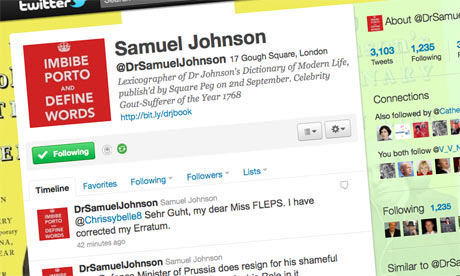
The success of the Twitter feed purporting to be the 140-character updates of none other than Dr Samuel Johnson, in which wry, satirical definitions are given to common words, would seem to be a very 21st-century phenomenon.
The real Dr Johnson died in 1784 – but it was his devotion to lexicography that paved the way for Tom Morton, the man behing the tweets, to offer gems such as "Valentine (n.) Patron-Saint of avaricious Florists & the MAWKISH: his Feast mark'd by Consumption of pinkish Victuals" on the social networking site. Last year the tweets made the leap to a proper book, Dr Johnson's Dictionary of Modern Life, subtitled a "Survey, Definition & justify'd Lampoonery of divers contemporary Phenomena, from Top Gear unto Twitter", published by Random House imprint Square Peg.
Such satirical observations in dictionary-style format are, though, nothing new. I have on my desk a 1973 copy of Professor Branestawm's Dictionary, a slim volume of definitions that are gentler than Morton's but punningly clever nonetheless.
The good Prof was the creation of Norman Hunter, a stage magician turned children's author. His first book featuring the archetypal absent-minded professor was published in 1933 and illustrated by Heath Robinson. Professor Branestawm's dictionary includes such delights as "Copper nitrate: What policemen get paid for working overtime in the evenings" and "Testimony: "Bad tempered coins." Yes, most of them are groanworthy, but they certainly appealed to my nine-year-old self.
Perhaps the very first such dictionary was that by the Persian Nizam-od-Din Obayd-i Zakani, who wrote his lexicon back in the 14th century. I'm not sure the humour travels well over the intervening centuries, though. Samples include: "THOUGHT: What uselessly makes people ill" and "ORATOR: A donkey."
But satirical dictionaries came into their own in the post-Victorian era. Take Gustave Flaubert's Dictionary of Received Ideas, posthumously published in 1911-1913 and based on the Madame Bovary author's notes on French society four decades earlier. Flaubert had apparently always been entranced by the idea of a satirical dictionary. His effort was woefully short but was conceived as the coda to the unfinished novel Bouvard and Pecuchet, two humble copy clerks who decide to dedicate themselves to learning everything after coming into an inheritance. The dictionary was intended to be the bathetic conclusion to their futile journey through scholarship: copying out the parroted worldviews of their contemporaries. ("CELEBRITIES Find out the smallest details of their private lives, so that you can run them down." How times change.)
Around the same time as Flaubert's dictionary there emerged perhaps the best-known example of the form, and one which celebrates its centenary this year: Ambrose Bierce's Devil's Dictionary. (Bierce was most famed for his supernatural works, and suitably disappeared without trace in 1913 while attempting to report on the Mexican revolution.) His lexicon, published fully for the first time as The Devil's Dictionary in 1911, is shot through with the savage satire that apparently earned him the nickname "Bitter Bierce".
Entries include:
TOMB, n. The House of Indifference. Tombs are now by common consent invested with a certain sanctity, but when they have been long tenanted it is considered no sin to break them open and rifle them, the famous Egyptologist, Dr. Huggyns, explaining that a tomb may be innocently "glened" as soon as its occupant is done "smellynge"
and:
GENEALOGY, n. An account of one's descent from an ancestor who did not particularly care to trace his own.
Bierce quite rightly takes his place, in my mind, as the king of the satirical dictionary compilers. Heaven knows what definition he'd give to the sort of person who impersonates Dr Samuel Johnson on the internet – or, for that matter, the 13 folk with Twitter accounts under the name "Ambrose Bierce".
There's something about the dictionary format that lends itself to satire eminently well. Perhaps it's the presumed knowingly-arched eyebrow as a devastating definition is delivered "without comment". Or maybe the way buzzwords can pass with increasing rapidity from po-faced sincerity to laughable self-parody makes a dictionary the best way of highlighting the chasm between what words originally meant, and what they come to mean in the satirist's alchemical furnace.

